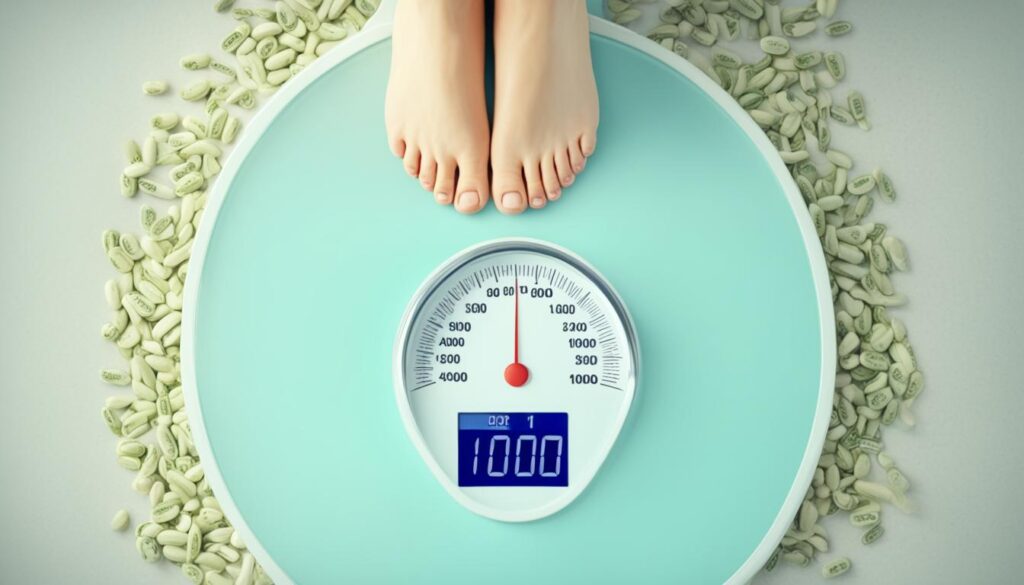Have you ever thought about how levothyroxine might be tied to losing weight? Levothyroxine is for fixing low thyroid, called hypothyroidism. Does it really make people lose weight? Let’s look closer at this and see if it helps with dropping pounds.
Levothyroxine helps by giving back the thyroid hormone thyroxine for those with low activity thyroids. It’s not for losing weight, but some folks might see the numbers on the scale change. Starting this can make you lose a little weight, mainly from water. But, it isn’t a fast solution for being overweight or for not living healthy.
Understanding Levothyroxine and Its Purpose
I get lots of questions about levothyroxine and what it does in the body. So, let’s take a closer look at how this medicine helps people with hypothyroidism.
What is levothyroxine?
Levothyroxine is a man-made form of thyroxine. This is a hormone that your thyroid makes. It helps treat hypothyroidism when your body doesn’t make enough thyroid hormones on its own.

How does levothyroxine treat hypothyroidism?
The main job of levothyroxine is to replace the missing thyroid hormone. You take it once a day, before breakfast. Doing this helps your body’s metabolism work like it should. And it can ease the symptoms of not having enough thyroid hormone.
Common symptoms of hypothyroidism
Hypothyroidism can make you feel not so great. Some signs are:
- Fatigue and weakness
- Unexplained weight gain
- Constipation
- Dry skin and hair loss
- Joint or muscle pain
- Depression
If you feel this way, talking to a doctor is key. They can figure out if levothyroxine is a good fit for you. The right treatment can make a big difference in how you feel and in your health.
The Relationship Between Thyroid Function and Body Weight
I’ve always been fascinated by our bodies. The thyroid gland is key in our weight control. It manages our metabolic rate which affects how we weigh.

When the thyroid doesn’t make enough hormones, we get hypothyroidism. This can make us gain weight. It happens because our body’s speed at burning calories slows down. But, too many hormones from an overactive thyroid can make us lose weight fast.
Having the right amount of hormones is crucial for our weight. These hormones change how our energy is used. They control our heart rate and digestion. If thyroid levels are not good, our body can get all mixed up.
- Underactive thyroid: Can lead to weight gain
- Overactive thyroid: May cause unintended weight loss
- Balanced thyroid: Helps maintain a healthy weight
Thyroid function is big in keeping our weight right. But, what we eat, do, and our general health matters too. If you worry about your weight and thyroid, see a doctor. They can check and help you feel better.
Can Levothyroxine Cause Weight Loss?
Levothyroxine helps treat hypothyroidism and might change your weight. I saw my weight shift when I started taking it. Let’s dive into how levothyroxine can impact your weight.
Initial Weight Changes
At first, I lost some weight while on levothyroxine. This often happens as your thyroid starts working better again. You might shed up to 10% of your weight due to less water in your body. Even though I was more hungry, I didn’t gain weight right away.
Long-term Effects on Body Weight
Levothyroxine’s long-term impact on weight can be different for everyone. For me, my weight just seemed to stay the same after the initial drop. Some get back to how much they weighed before having hypothyroidism. Remember, don’t take levothyroxine just to lose weight if you don’t need it for your thyroid.
Factors Influencing Weight Changes
Many things can make levothyroxine affect your weight. These include the right dosage, taking it every day, what you eat and how active you are, and how your body burns energy. Everyone reacts differently.
I learned that getting my thyroid levels checked was key to taking the right amount. Changing my lifestyle helped me manage my weight along with levothyroxine. Each person’s response to thyroid medicine can be unique. So, talk to your doctor a lot to make sure it’s working well for you. They might adjust your treatment to help your weight and health.
Proper Use and Dosage of Levothyroxine
When it comes to thyroid medicine, taking it right is very important. Everyone’s levothyroxine dose is different. So, make sure to do what your doctor says.
To get the most out of levothyroxine, take it in the morning. Take it before you eat. And don’t drink your morning coffee for at least half an hour. This helps your body absorb the medicine better.
At first, adults usually start with a dose between 50 and 100 micrograms. But, how much you need can change. It depends on things like your age, weight, and how serious your thyroid problem is.
- Age
- Weight
- Severity of hypothyroidism
- Other health conditions
Getting your blood tested often keeps an eye on your thyroid levels. Your dose might need to be lowered or raised from time to time. Make sure to regularly take your medicine. Don’t stop taking it unless your doctor says you can.
Taking your thyroid medicine right is crucial for it to work. Trust your doctor’s advice and let them know if you’re worried or have any problems. They are there to help you.
Potential Side Effects of Levothyroxine
Levothyroxine is a thyroid medicine with some side effects. Let’s look at the common and serious ones. Knowing these risks can help you handle your treatment better.
Common Side Effects
Levothyroxine might cause mild problems when you first start taking it. But these usually stop as your body gets used to the medicine:
- Nausea and vomiting
- Diarrhea
- Headaches
- Weight changes
- Muscle weakness
- Changes in appetite
Serious Side Effects to Watch For
Some levothyroxine side effects are rare but dangerous. If you have these, get help right away:
- Chest pain
- Irregular heartbeat
- Difficulty breathing
- Severe headaches
- Allergic reactions (swelling, rash)
When to Contact Your Doctor
If you have serious or lasting side effects, call your doctor. They will do blood tests to check your thyroid’s health and may change your dose. Always talk to your doctor first about any issues with levothyroxine.
Monitoring Thyroid Function and Adjusting Treatment
Getting thyroid function tests is very important. They help manage hypothyroidism well. Doctors use these tests to watch your hormone levels. They also use them to adjust your levothyroxine dose as needed. At the start, you might need lots of check-ups. But, with stable levels, once a year is usually fine.
Hormone level monitoring is super important. Big life events like pregnancy can change how much levothyroxine you need. That’s why keeping track of your symptoms and side effects is key. I always encourage my patients to keep me updated. It helps me make their treatment just right for them.
Looking at lab numbers isn’t all we do. It’s about each person finding their perfect balance. By watching thyroid function closely, we can adjust at the right times. This makes sure patients feel their best without any risks. Everyone’s health path is different. Working closely with your doctor makes sure you’re getting the best thyroid care.
